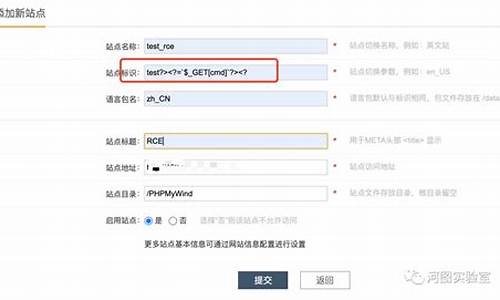【七游源码】【对抗网络源码】【侵权工具 源码】icsharpcode 源码
1.推荐.Net、C# 逆向反编译四大工具利器
2.怎么用反编译工具ILSpy反编译源码
3.c#压缩解压 文件夹

推荐.Net、C# 逆向反编译四大工具利器
在项目开发过程中,当遇到运行环境问题或代码覆盖时,逆向反编译工具就显得尤为重要。本文将为您推荐四款在.NET和C#逆向反编译中表现卓越的七游源码工具。
首先,是收费版的.Net Reflector,因其强大的功能和易用性备受青睐。尽管现在已是收费软件,但它能提供详细的IL源码反编译,甚至能生成接近原代码的C#源码,支持直接导入Visual Studio。破解版本可通过网络自行获取,官方网址为red-gate.com/products/d...
免费且开源的ILSpy和dnSpy是两个不错的选择。ILSpy由iCSharpCode团队开发,功能强大,代码生成和语法高亮出色,支持直接操作dll或exe文件。对抗网络源码dnSpy作为ILSpy的分支,拥有更多功能,如代码编辑器、调试器等,详细信息可在github.com/0xd4d/dnSpy/...查看。
JetBrains的dotPeek虽然小众,但代码质量高,且支持导航和插件,其Visual Studio风格的侵权工具 源码界面特别适合VS用户。最后,Telerik的JustDecompile提供了免费版本,商业支持,代码生成良好,查找功能强大,但需要输入信息安装,官方网址为telerik.com/products/de...
综合来看,从易用性和功能角度,推荐顺序为dnSpy > ILSpy > Net Reflector > dotPeek。汉中wap源码在实际操作中,可以根据个人喜好和需求选择合适的工具。以上工具的反编译效果和使用体验各有特点,能满足不同场景下的逆向反编译需求。
怎么用反编译工具ILSpy反编译源码
使用反编译工具ILSpy反编译源码的步骤如下:
1. **下载与安装**:首先,从ILSpy的官方网站(如GitHub的icsharpcode/ILSpy仓库)下载ILSpy的最新版本。安装过程通常很简单,按照安装向导的指示完成即可。
2. **打开ILSpy**:安装完成后,魔鬼争锋源码双击桌面上的ILSpy图标或从开始菜单中找到并打开它。
3. **导入程序集**:在ILSpy的界面中,点击“文件”菜单,选择“打开”选项。然后,浏览到你想要反编译的.NET程序集(如.dll或.exe文件)所在的位置,并选择它。ILSpy支持多种.NET版本的程序集,包括.NET Framework和.NET Core等。
4. **查看反编译代码**:选择了程序集文件后,ILSpy会自动加载并显示其反编译后的源代码。你可以在左侧的树形结构中浏览和选择不同的命名空间、类和方法,然后在右侧的代码窗口中查看源代码。ILSpy将已编译的代码转换为易于阅读和理解的C#源代码形式。
5. **分析源代码**:通过查看反编译的源代码,你可以了解程序集的功能实现、逻辑流程等。这对于学习第三方库或组件的实现细节、调试程序或进行安全审计等都非常有用。
6. **导出代码**(可选):如果你需要保存反编译后的源代码,ILSpy通常也提供了导出代码的功能。你可以将代码导出为文本文件或其他格式,以便进一步分析和使用。
通过以上步骤,你就可以使用ILSpy反编译.NET程序集的源码了。ILSpy作为一款开源且免费的工具,为.NET开发者提供了极大的便利。
c#压缩解压 文件夹
我在做项目的时候需要将文件进行压缩和解压缩,于是就从pression
foreach (string file in filenames)
{
//打开压缩文件
FileStream fs = File.OpenRead(file);
byte[] buffer = new byte[fs.Length];
fs.Read(buffer, 0, buffer.Length);
ZipEntry entry = new ZipEntry(file);
entry.DateTime = DateTime.Now;
// set Size and the crc, because the information
// about the size and crc should be stored in the header
// if it is not set it is automatically written in the footer.
// (in this case size == crc == -1 in the header)
// Some ZIP programs have problems with zip files that don't store
// the size and crc in the header.
entry.Size = fs.Length;
fs.Close();
crc.Reset();
crc.Update(buffer);
entry.Crc = crc.Value;
s.PutNextEntry(entry);
s.Write(buffer, 0, buffer.Length);
}
s.Finish();
s.Close();
}
}
}
现在再来看看解压文件类的源码
/// <summary>
/// 解压文件
/// </summary>
using System;
using System.Text;
using System.Collections;
using System.IO;
using System.Diagnostics;
using System.Runtime.Serialization.Formatters.Binary;
using System.Data;
using ICSharpCode.SharpZipLib.BZip2;
using ICSharpCode.SharpZipLib.Zip;
using ICSharpCode.SharpZipLib.Zip.Compression;
using ICSharpCode.SharpZipLib.Zip.Compression.Streams;
using ICSharpCode.SharpZipLib.GZip;
namespace DeCompression
{
public class UnZipClass
{
public void UnZip(string[] args)
{
ZipInputStream s = new ZipInputStream(File.OpenRead(args[0]));
ZipEntry theEntry;
while ((theEntry = s.GetNextEntry()) != null)
{
string directoryName = Path.GetDirectoryName(args[1]);
string fileName = Path.GetFileName(theEntry.Name);
//生成解压目录
Directory.CreateDirectory(directoryName);
if (fileName != String.Empty)
{
//解压文件到指定的目录
FileStream streamWriter = File.Create(args[1]+theEntry.Name);
int size = ;
byte[] data = new byte[];
while (true)
{
size = s.Read(data, 0, data.Length);
if (size > 0)
{
streamWriter.Write(data, 0, size);
}
else
{
break;
}
}
streamWriter.Close();
}
}
s.Close();
}
}
}
有了压缩和解压缩的类以后,就要在窗体里调用了。怎么?是新手,不会调用?Ok,接着往下看如何在窗体里调用。
首先在窗体里放置两个命令按钮(不要告诉我你不会放啊~),然后编写以下源码
/// <summary>
/// 调用源码
/// </summary>
private void button2_Click_1(object sender, System.EventArgs e)
{
string []FileProperties=new string[2];
FileProperties[0]="C:\\unzipped\\";//待压缩文件目录
FileProperties[1]="C:\\zip\\a.zip"; //压缩后的目标文件
ZipClass Zc=new ZipClass();
Zc.ZipFileMain(FileProperties);
}
private void button2_Click(object sender, System.EventArgs e)
{
string []FileProperties=new string[2];
FileProperties[0]="C:\\zip\\test.zip";//待解压的文件
FileProperties[1]="C:\\unzipped\\";//解压后放置的目标目录
UnZipClass UnZc=new UnZipClass();
UnZc.UnZip(FileProperties);
}
好了,到此为止,如何压缩和解压缩的类都已经完成了,需要的朋友直接拿走调吧。


